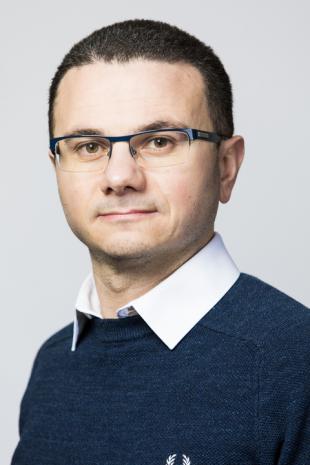Engineering Discipline:
- Chemical Engineering
Academic Qualifications:
- PhD in Energy, Università Politecnica delle Marche, Ancona (Italy), 2009
- MSc in Mechanical Engineering, Università Politecnica delle Marche, Ancona (Italy), 2004
Professional Qualifications and Memberships:
Teaching:
- Chemical Engineering 1 Laboratory CHEE08001
- Engineering Mathematics 2 SCEE08010
- Chemical Engineering Design: Synthesis and Economics 4 CHEE10005
- Chemical Engineering Design 4 CHEE10010
- Chemical Engineering Study Project 4 CHEE10009
- Chemical Engineering Design Project 4 CHEE10002
- Chemical Engineering Research Project 5 CHEE11017
- Chemical Engineering Industrial Project 5 CHEE11014
Research Interests:
The research in my group is amed at developing new technologies powered by low grade heat, the worst quality of energy on the Earth, available in great quantity especially as solar heat. Our work ranges from thermodynamics to actual prototyping and testing, using thermodynamics as the necessary framework for the early understanding of materials and processes. The majority of our research integrates nanoporous materials because often they enable the formulation of processes otherwise impossible and the reduction of the energy demand compared to traditional solutions.
My group touches upon the following research activities:
- Development of Heat Powered Adsorption Technologies for zero carbon and negative carbon future, addressing the next global big challenges. Examples include the following systems which use heat at temperature <150°C (including solar thermal energy):
- Design and testing of adsorption for cooling, heat pumping and heat storage and desalination by using low grade waste heat and solar thermal energy
- CO2 capture from air (air capture) with nanoporous materials and temperature swing adsorption
- Drying with nanoporous materials
- Experimental investigation on nanoporous materials with special focus on supported ionic liquids and ionogels
- Fluid phase equilibria with special focus on adsorption thermodynamics and liquid-liquid equilibria
- Biodiesel production process
Some of the novel technologies generated in my group are:
Stand-alone adsorption refrigerator for humanitarian aid. This technology provides stand-alone cooling for vaccines storage. Every day thousands of children die because of vaccination-preventable diseases. A key challenge for immunization programmes in many areas of the world, where no cooling facilities or electrical grid is available, is storing the vaccines at the right temperature until the administration. We have developed a stand-alone solar ice maker, where solar thermal energy is used to regenerate, during the day, an adsorption bed enclosed in a solar thermal collector. During the night, cold is produced and stored in form of ice.
Super-efficient household devices. We have developed a new generation of dishwashers with 41% energy saving compared to Class A technology. The new process operates by integrating an adsorption bed in the dishwasher to dry the enclosed air and accordingly the dishes. The same bed is regenerated during the successive washing, releasing hot water vapour that is useful for more effective cleaning.
Air capture. Although the majority of research efforts focus on large, concentrated CO2 emitters, CO2 removal from the ambient air (air capture) is a complementary measure for the mitigation of small and distributed emissions. In the ACCA project, supported by the European Union, we are developing a proof of concept prototype to capture carbon dioxide directly from the atmosphere. Similarly to the two previous systems, this is a thermally-driven adsorption process.
Desalination. Gist of this project, supported by the European Union, is the generation of electricity from salinity gradients using a Reverse Electrodialysis in a closed-loop system. Artificial saline solutions are subject to salinity swings by means of multi effect distillation/adsorption-based separation, which uses low-temperature heat as its energy source.
Research Group members: Dr. Ahmed Askalany (Post-doc, energy efficient drying in wet appliaces); Christopher Olkis (PhD student, Desalination), Christopher Jumbo (PhD student, Air Capture), Jonny Cranston (MSc student, drying)
Former members: Charithea Charalambous (PhD student, Air Capture); Chiara Di Santis (PhD student, Heat Transformers); Matteo Franciolini (visiting student, presently PhD student, Università Politecnica delle Marche, liquid-liquid equilibria); Andrea Frazzica (visiting researcher, presently Researcher at CNR-ITAE, investigation on AQSOA-Z02 for CO2 capture ); Susanna Maisano (visting researcher, presently Research at CNR-ITAE, liquid liquid equilibria); Fraser Stuart (research student, desalination); Solene Cargill (research student, liquid-liquid equilibria).
Specialities:
Low grade heat, thermal energy storage, adsorption heating and cooling, adsorptiond desalination, solar thermal energy, temperature swing adsorption, heat transformers, thermodynamics, heat transfer, ionic liquids, ionogels.



